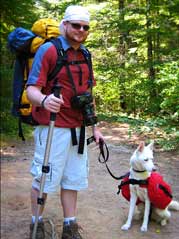
City wuss in Burnt Lake
In terms of greenhouse gas emissions, downtown living is about the best most of us can do. Small dwellings, no auto; walk or cycle round the area. But what happens when city dwellers want to get their dose of countryside at weekends?
When weekenders arrive from the city it can often spell doom for the local rural community and the local environment, but not all weekend home owners are eager to embrace modern conveniences and make their places into suburbs. A group of cottages in Canada provide a model for other off-grid second homes to follow.
Eight years ago, spurred by the threat of new development and possible division of lots, cottagers on a lake near Parry Sound, Ontario organized successfully to get a federally sanctioned ban on motorboats and jet skis.
But Burnt Lake owners went further. In addition to the no-motorboats rule, all the lake’s 17 cottages are off-grid; cottagers must
use alternative energy sources such as solar, wind and propane if they want to run stoves, refrigerators, TVs and computers.“Nobody here uses computers,” says Jack Jewell a resident of 37 years standing, whose only power source is solar and who heats his home in the winter with a fireplace and wood stove. “But we wanted people to know these services are available to us.”
There are also no lawns and nobody uses fertilizers. Instead of septic tanks, Burnt Lake cottagers use composting toilets and outhouses. Cleaning has to be done with biodegradable soaps and detergents.
There are a few other motor-free lakes in the province, but the conservationist attitudes and actions of the Burnt Lake Cottagers Association are the exception rather than rule.
Rees sees a striking contrast between people with older, basic, seasonal cabins and those with newer, “stately” full-time homes and manicured lawns.
“If someone wants a lawn and takes away all the existing shrubs and bushes, it makes a big difference,” Rees says. “The whole character of the area changes. Instead of native grasses and shrubs thriving without water and fertilizers, there are chemicals introduced to prevent dandelions. And these chemicals work their way into the soil and lake water when it rains.”
The increase in fertilizer use has led to growth of blue-green algae in lakes, which not only smells bad, but can kill fish when it decomposes and removes oxygen from the water, ultimately destroying delicate eco-systems.
Although surface water gets mixed with gasoline from boats and animal waste, “a filter takes these things out of the water, making it safe to drink,” Wilson says.
Filters installed under sinks range in price from $200 to $1,000, depending on size. Brita filters are a less expensive option, ranging from $20 and up at department stores and supermarkets. One filter is $11 and lasts two months. But Wilson says people don’t change these filters enough, often rendering them useless, like a sponge that has absorbed all it can.
Septic systems, which treat water and sewage, are essential at many cottages, but when there are so many systems, they’re a big risk to the local water table.
Newcomers to cottage country should know that toilet waste is going into their yard, so it’s important to make sure the cottage is built far enough away from the water.
Jewell of Burnt Lake runs his cottage sewage water into a leaching pit – a hole in the ground with 15 centimetres of sand and 15 centimetres of stone. The sand acts as a filter for the water and the pit is at least 23 metres from the lake. By the time the water reaches the lake, it’s clean.
“We are great recyclers and lovers of the environment and do our best not to disturb it,” Jewell says. “The message is that it can be done. Our water quality is tested every single year and our rating continues to be one of the highest tested.”
The care and cleanliness of another cottage association in operating their septic systems has led to an international Blue Flag designation, according to Peter Siebert, chair of Friends of Sauble Beach.
He has been a cottager for 33 years and is proud of the international designation his cottage association received in 2006.
Sauble Beach was the first beach on Lake Huron and the second beach in North America to receive the Blue Flag, which indicates that the water is consistently safe for swimming.
“You need to pump (out) your tank every two or three years and watch what you put down the drain,” he advises. “It’s really common sense. Don’t put oils, grease, fat, bleaches or toilet bowl cleaner down. Bacteria makes this system work by breaking down the sewage, so think of it as a living thing which can be harmed by non-biodegradable cleaning products and toxic materials.”
Another threat to the delicate eco-system of cottage country is the introduction of new species from other parts of the world. With no natural predators, they can devastate the natural habitat.
70 per cent of these zebra mussels and spiny water fleas come from ballast water from boats that arrive from Eastern Europe and get trailered from one body of water to another. Similarly, fish bait in buckets has led to the proliferation of a deadly fish virus.